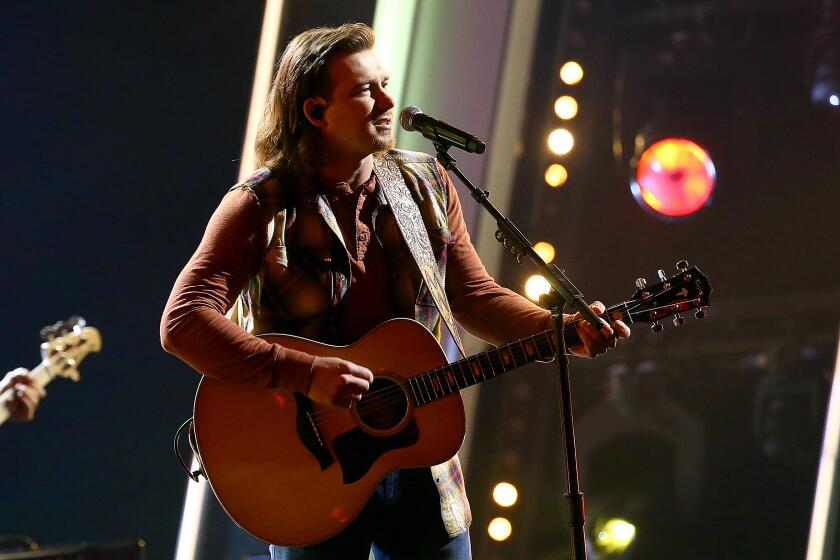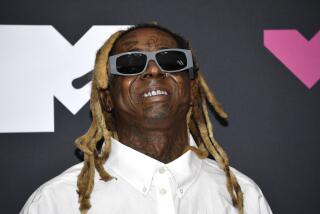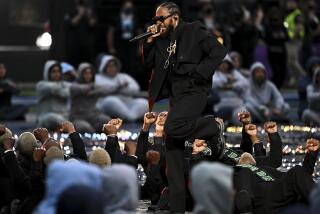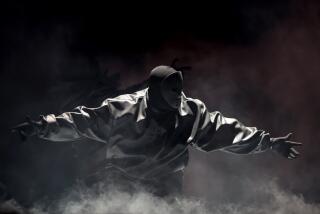The Weekndâs chilly pop makes for a socially distant Super Bowl halftime show
Because of the COVID-19 pandemic, there was never a chance that the Weekndâs halftime show at Super Bowl LV would feel like business as usual for pop musicâs most-watched annual performance.
But even by the strange standards of our socially distant age, Sunday nightâs showing by this edgy Canadian pop-soul auteur was a proud outlier.
Instead of doing his thing in the middle of the football field, as halftime acts have done for decades, the Weeknd spent most of his 14-minute performance in the stands beneath a giant video screen at Tampaâs Raymond James Stadium.
Tired of âBlinding Lightsâ? Neither are we, so to prep for The Weekndâs Super Bowl halftime show, we offer this ranked list of every song from his new best-of.
In place of smiling dancers flexing their athletic bodies, he was surrounded at various points by red-eyed people impersonating robots and by guys wearing head bandages as though theyâd just survived a brutal car crash (or perhaps a round of cosmetic surgery).
And instead of punctuating his set with some old rock classic meant to push NFL fansâ nostalgia buttons, the Weeknd threw in a bit of âHappy Houseâ by Siouxsie and the Banshees â almost certainly the first early-1980s goth flashback in Super Bowl history.
Spooky yet darkly funny, this appealingly bizarre spectacle reflected the COVID era in both mood and logistics. The songs sported bleary textures and dramatic words about feeling alienated from oneâs body; there was zombie-like dancing by those bandaged dudes that surely triggered viewersâ unease about the danger posed right now by a crowd.

And a considerable (and instantly meme-able) stretch of the show took place in a small interior space â a gold light-filled chamber beneath the stadiumâs bleachers â not unlike the ones many of us have been living in for close to a year.
But this is also who the Weeknd is: a 30-year-old singer with an angelic voice who writes about all the ways in which love (or drugs) can kill a person â or sometimes bring a person back to life.
Radio companies and streaming services swiftly rebuked Morgan Wallen for using a racial slur, but Wallen is just a symptom of a larger problem in country music.
His set, which he told Billboard he spent $7 million of his own money to help mount, was a fast-moving medley of some of the irresistible hits that despite their crushing pessimism, have made him one of popâs biggest stars over the last half-decade: âStarboy,â during which those robots jerked their arms with uncanny precision; âThe Hills,â about a life gone to ruin thanks to celebrity excess; âCanât Feel My Face,â which compares the charge of a new infatuation with the thrill to be had by snorting a line of cocaine; and âEarned It,â an orchestral ballad that he sang as though he were the headliner at some dystopian Las Vegas supper club.
And because he stuck so closely to his signature vibe, he seemed incredibly at ease as he performed for the tens of millions of people watching at home. He grinned; he winked; he took opportunities to look deep into the camera â lots more closeups than usual in this show â as he sang in âI Feel It Coming,â a gorgeously futuristic electro-soul ballad, about a woman whoâs been âscared of love and what it did to you.â
Have no fear, he seemed to be saying â youâve been through the worst.
The show ended, as anyone knew it must, with âBlinding Lights,â the Weekndâs unavoidable â80s-style pop smash thatâs stayed near the top of the Hot 100 for more than a year now. (Minus âBlinding Lights,â it seems impossible to imagine that the Weeknd wouldâve ever ended up on the Super Bowl short list.)
For that one, he finally descended to the field, sashaying in a sparkly red suit jacket through the Kansas City Chiefsâ end zone, to cavort among his head-wound accomplices as fireworks shot off into the Florida sky over the stadium.
But his big, fist-pumping finish is also where he did those few sexy-gloomy bars of âHappy Houseâ â a reminder that weird times call for weird superstars.
More to Read
The biggest entertainment stories
Get our big stories about Hollywood, film, television, music, arts, culture and more right in your inbox as soon as they publish.
You may occasionally receive promotional content from the Los Angeles Times.












